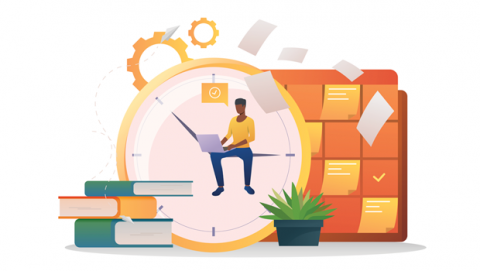Thanks to COVID-19, there’s probably never been a better opportunity to embrace unconventional time management strategies. With the world attempting to restart and rejuvenate the economy amidst today’s crushing uncertainty, it’s even more important to find techniques that work for you.
Read on for some unconventional tips that might just change how you see time management.
1. Manage energy, not time
The global pandemic is affecting all of us in different ways. Whether you are an introvert, an extravert, or somewhere in between, our current circumstances have likely found a way to sap your energy.
For me, being unable to brainstorm ideas with other people has made it difficult to maintain inspiration and motivation (even when I get to work on some of the most interesting software, hardware, and science problems of our time). So now more than ever, it’s essential to manage your energy in unconventional ways.
For example, does it sometimes make sense to take a nap after a meeting instead of tackling some busywork? Absolutely. When your energy is low, keeping yourself busy in the moment may feel like the right approach, but in the long run, your productive energy and creative energy will be sapped.
[ Are you over-communicating and not engaging? Read our related story: Remote leadership: 9 ways your style may backfire. ]
Take the time to solve systemic issues that may be directly affecting you or someone close to you. If something is preventing you (or perhaps a spouse or a roommate) from sleeping, the energy you can give to your work, along with your general quality of life, will suffer.
Here’s a personal example: In the northeastern United States, fall brings shorter days, cooler temperatures, and, as anyone who lives in an older house can attest, mice and other animals finding their way inside.
When these critters started crawling around looking for food at night, it kept my wife awake. Solving this problem felt like a distraction at first, but it turned out to be necessary to ensure a good night’s sleep. Once the mouse problem was solved, everyone in the house slept better and had better energy.
2. Manage priorities, not time
Nothing saps your energy more than having an important task hanging over you and not doing it. That’s where the somewhat unconventional strategy of “eating the frog” can help.
As Mark Twain said, "If it’s your job to eat a frog, it’s best to do it first thing in the morning. And If it’s your job to eat two frogs, it’s best to eat the biggest one first."
Think about the most essential item on your to-do list – one that you have been actively avoiding – and do that first. Checking email or your calendar keeps you busy and may trick you into thinking you are being productive. But in the long run, it will sap your energy and motivation, and you’ll end up wasting too much time avoiding important tasks.
Second best: Do the tasks you’ve committed to doing for others. When people are depending on you to complete something, doing it will earn you small wins and builds momentum.
The lesson? Eat the frog before you do anything else.
[ How do your team meetings stack up? Read also: Zoom tips: 6 ways to make meetings better. ]
3. Manage your brain, not time
There’s also a big-picture benefit of eating the frog: This strategy can actually rewire your brain for success.
Neuroplasticity is the concept that the brain (even the adult brain) can build new pathways. Each time you train your brain to eat the frog, it gets easier to do next time. That’s because you’re building a pathway and retraining your brain to do something that’s challenging.
Speaking of unconventional strategies, as an exercise, consider brushing your teeth with your non-dominant hand or taking a cold shower tomorrow morning. You can change your brain and convince yourself that you can, and should, do hard things. Your brain – and your productivity – will thank you for it.
4. Manage what's essential, not time
Don’t manage time, manage what’s essential: This unconventional time management strategy might translate to “only eat frogs.”
People will respect you more in the long run if you make strong progress on fewer important things than if you make little progress on many things. Your colleagues may initially worry that you aren’t taking on as much, but the high quality of your work means you’ll move the needle on the things that matter more.
In other words, the frogs will get eaten. The broader concept here is essentialism: Less, but better.
[ Can you ask for a raise during a pandemic? Yes, read: How to ask for a raise during COVID-19. ]
5. Manage focus, not time
It can be especially difficult to maintain focus and attention in times of stress and uncertainty. A helpful approach is to use the Pomodoro Technique: Work on a task for 25 minutes, followed by a five-minute break.
Those short breaks are essential. After 25 minutes, your mind may start to drift, and you will be less likely to retain information. Practicing mindfulness and meditation can also help improve your ability to focus and concentrate.
6. Manage your emotions, not time
In these unprecedented times, it’s critical to manage your emotional health. Relationships with family and friends are fundamental, so don’t forget to check in with others regularly. Remember that everyone processes challenges and uncertainties differently, so be a listening ear for someone else whenever you can.
Finally, find ways to laugh. Adding a little fun to your day can make a big difference in your well-being.
Want to learn more about neuroplasticity, essentialism, and other related topics in this article? Check out these resources:
- Limitless by Jim Kwik
- Essentialism by Greg McKeown
- The Mind and the Brain by Jeffrey M. Schwartz
[ Get exercises and approaches that make disparate teams stronger. Read the digital transformation ebook: Transformation Takes Practice. ]






